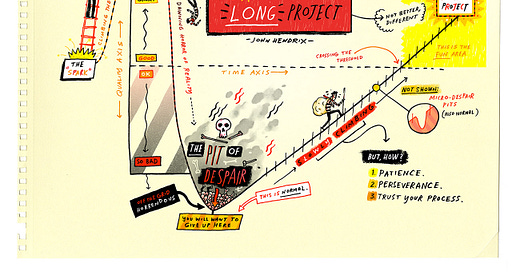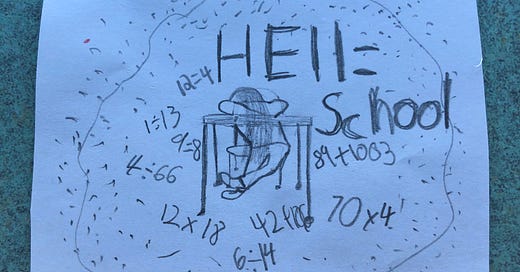
Discover more from Adrian’s Newsletter

I’ve been on summer break for eight weeks. In that time, I’ve slid into the wonderful routine of waking up, making a cup of tea, reading a book, refilling my tea, and watching the birds flit in and out of my backyard. At some point, I eat breakfast and transition to some writing before my three teenage kids wake up and we make a plan for the day. Pool? Field trip to the zoo? Family hike? Yard work? My kids are content to stay indoors watching movies and playing on their devices. During the school year, our goal is no more than two hours of non-school-related technology time during the day. During the summer, we’ve extended this to having a tech-free day during the week where we play board games, read, nap, listen to music, and hang out as a family.
It is inevitable that someone is going to get bored. Whereas I’m content to read and write all day, my teenagers struggle with the lull of summer break. Technology has such a strong pull, that it seems impossible to resist the urge to plug in and numb.
There are many creative and psychological benefits of boredom.
has written extensively about the subject here and most recently, here. Kleon approaches boredom as a prerequisite to being an artist, and if you’ve read any of his incredible newsletter (going strong since 2013), you know that he advocates for an unplugged and kinesthetic summer for his entire family. He loves sitting around and doing nothing.Creative people need time to sit around and do nothing.
Austin Kleon
He often posts pictures of his bicycle rides through Austin, his collage work, and love of journals and mixtapes. It’s clear that his sons enjoy drawing and being creative as much as he does. His son, Owen, is even an burgeoning music maker! Kleon’s parenting style is one I try to emulate with my own children: letting kids be kids.
My wife and I held off getting our kids devices for as long as we could. The pandemic forced us to get our oldest a laptop for school, and quickly, technology became a contentious issue. I have regrets in those early days, arguing with my son about his technology use, trying to micromanage his technology, and ultimately judging how much time he spends online. Since Jonathan Haidt’s book The Anxious Generation came out, everyone seems ready to either agree or reject his premise: No smartphones before high school. No social media before 16. Phone-free schools. Far more unsupervised play and childhood independence. I’ve only read one article that argues for a more balanced and reasonable approach. As a teacher, I see the problem that social media and smartphones have created for teaching and learning in the classroom. As a parent, I understand how easy it is to let technology babysit my kids. As a human being who grew up in the early days of the Internet and the birth of social media and streaming services, I empathize with how challenging it is to avoid using my smartphone to eliminate feelings of boredom. However, the more I’ve learned about boredom as a cognitive state, the more I realize how futile (and unhealthy) it is to fight those summer feelings of listlessness and dissatisfaction. I can’t just force my teenagers to unplug and be bored because it is good for them. In their book, Out of my Skull: The Psychology of Boredom, James Danckert, a neuroscientist, and John D. Eastwood, a psychologist, state that it is good “on occasion, to be understimulated by the world. It is good to accept less stimulation, to resist the urge to let things outside ourselves drive and control what we do.” This is many times easier said than accomplished.
One day each week, usually Saturdays, as a family we put our devices away for the day. If I’m being completely honest, sometimes I check my email and read a few Substacks early in the morning before my teenagers wake up. Once everyone is awake, we decide how we are going to spend our day. What I’ve noticed is that the success (or failure) of these unplugged days depends entirely on our family’s commitment to the goal to be present together. If my wife forgets and starts watching some YouTube videos, it is difficult to motivate our kids to avoid doing the same. We will often play family board games so that we are all equally involved in maintaining our tech-free day. Only when we are all engaging with each other are we able have a successful day sans technology.
Sometimes, we need to get the family out of the house; or as we like to call it: Forced Family Fun. This means waking the kids up early and going on a field trip. Once everyone is awake and fed, we pile into the car and head to the zoo or the museum or we drive into the mountains to hike. We’ve been regulars at the Denver Zoo and the Denver Museum of Nature and Science since the kids were babies. These places were lifesavers for my wife, then a stay-at-home-mom, when she needed to get the kids out of the house. It’s less work then it used to be, but the upside is that no matter how old our kids get, they still seem to enjoy going to the zoo or museum. Sometimes, there is a special exhibit at the museum, or a special animal event at the zoo, but more often than not, we just wander around, revisiting these familiar childhood locales.
Recently, we tried something new. We took the kids to see The Dark Side Of The Moon 50th Anniversary Planetarium experience. We gave them no context. My oldest son knew about Pink Floyd, but he hadn’t really spent much time with their discography.
To say they had a mind-bending planetarium experiences is an understatement! They had no idea what they were experiencing and absolutely loved every minute of it! All three of my kids immediately Googled The Dark Side of the Moon afterward. They wanted to know the lyrics, better understand the concept album, what it meant, and how the album was created. Our dinner conversation that evening was lively!
“I’m Bored!”
My wife and I cannot always be the remedy for our children’s boredom. We can’t afford to go on a field trip every day. As much as I want to dismiss my kids’ boredom as their failing, Danckert and Eastwood emphasize that boredom is a cognitive state and not one that is trivial or easy to overcome. “Boredom does not arise from a lack of things to do, or as a consequence of diminished motivation to engage. Just the opposite. Bored children know there are many things in the world to do and clearly want something that will satisfy them.” Raise your hand if you’ve suggested 26 options for your children to do on a boring summer afternoon, and they’ve rejected them all?
Why don’t you read a book? No.
Why don’t you write a story? No.
Why don’t you go for a walk? No.
Why don’t you listen to some music? No.
Why don’t you draw a picture? No!
A conversation with my middle son every day of summer vacation.
This summer, I’ve learned that I need to let my teenagers figure out how to ease their own ennui. According to Danckert and Eastwood, my children don’t necessarily need to find some flow state of hyper-engagement, and it’s unhealthy to avoid boredom, which our smartphones and infinity apps allow us to do. Doomscrolling on Twitter or Instagram may pass the time, but will never fulfill our need for authentic connection and agency. Danckert and Eastwood believe that all humans “need self-determined, effective connection with the world. We need to be engaged, mentally occupied, giving expression to our desires and exercising our skills and talents.” When we have agency, we feel fulfilled and often flourish creatively. When we don’t, we feel bored and disengaged. Instead of fearing boredom, Danckert and Eastwood view boredom as a call to action. We can numb it with YouTube Shorts or seek some new and exciting adventure that helps us reassert our agency and take actions to control our attention.
Here and Now
The truth is that I picked up Out of my Skull: The Psychology of Boredom so that I could find a surefire cure for my teenagers’ boredom. I wanted to better understand why my middle child, especially, struggles to find meaningful activities to engage in. Spoiler: Danckert and Eastwood provide no one-size-fits-all answer. Adaptive responses to being bored can include seeking a state of flow, fostering curiosity, and relaxing.
This summer, one way we have combated boredom as a family is being more mindfully occupied instead of merely occupied. I’m having conversations with my teenagers about finding things that matter to them and doing activities for their own sake (instead of avoiding being bored). When I list out random things my middle son can do, none of those are activities are ones that engage him as his unique self. Instead, I’ve learned that he loves lifting weights and exercising. He loves being out in nature. I’m connecting with him and working to incorporate more of the types of opportunities he values. It’s also important to note that not every activity needs to be exciting; not every minute of every single day needs to be filled. It’s okay to be idle.
Idleness is not just a vacation, an indulgence or a vice; it is as indispensable to the brain as vitamin D is to the body, and deprived of it we suffer a mental affliction as disfiguring as rickets. The space and quiet that idleness provides is a necessary condition for standing back from life and seeing it whole, for making unexpected connections and waiting for the wild summer lightning strikes of inspiration — it is, paradoxically, necessary to getting any work done.
Tim Kreider
I go back to school in four weeks; my kids go back in five. In these last Dog Days of summer, I’m going to be idle and appreciate these periods of down time. I’m not going to fill them with externalities that trol my attention or guide my thinking and behavior. I’m going to be engaged on my own terms and pursue goals that enrich my life, including reading a few more novels, writing every day, and taking evening walks with my wife after dinner. At times, I’m sure I will slip and fall down an internet rabbit hole. I will probably sacrifice some hours to social media, too. I want expand my efficacy, help my teenagers expand theirs, and prepare us for another school year. Here’s to giving ourselves what we need instead of what society tells us we need.
Have a great, relaxing week!
—Adrian
How are you spending your last days of summer break? Feel free to leave a comment!
Resources
I’m a fan of Ryan Holiday’s Daily Stoic. In fact, my son and I have been working our way through his book, The Daily Stoic. Those early morning hours, eating breakfast with my sleepy seventeen-year-old, and discussing Epictetus or Seneca, are memories I will always cherish.
I was absolutely chuffed when I discovered Holiday’s Daily Dad, and this interview with Austin Kleon. It is a great video!
Out of My Skull The Psychology of Boredom | James Danckert, John D. Eastwood
This is a wonderful book about what psychological studies have learned from studying boredom. Should we completely avoid being bored? What are ways to ameliorate being bored? I really enjoyed reading this book and learning about the evolutionary benefits of using boredom to motivate us to action.
5 Benefits of Boredom: How could we learn to benefit from boredom?
Whenever my teenagers complain about being bored, I parrot these five benefits. I can’t guarantee I’m convincing my kids to appreciate boredom, but it’s fun to try!
Steak Like An Artist | Austin Kleon
I highly recommend Kleon’s book, Steal Like An Artist. In fact, I think you should order the entire trilogy. These books are great for reading and rereading. I have copies in my classroom and at home, and I never walk by without picking one of them up to read a passage. I highly recommend you subscribe to his newsletter.
What Is Pink Floyd's Dark Side of the Moon Really About? An Introduction
If you’re like my kids, and want to know a bit about Pink Floyd’s Dark Side of the Moon, this article is a good place to start. WARNING! Researching Pink Floyd puts you at risk for disappearing down deep internet rabbit holes. Like this one. Proceed at your own risk!
The Best Beginner Board Games for Adults (and Kids)
This article showcases some of my favorite board games, including Ticket to Ride, Catan, Codenames, and Pandemic.
For those of you with younger kiddos, check out this list of board games.

















Helpful, inspiring. Great writing. I appreciate your positive tone!
"Mindfully occupied instead of merely occupied" is fantastic. Goals! I loved this post, Adrian. Thank you for it.
What I'm doing this summer. Plenty of behind-the-scenes admin tasks, connecting with people over coffee/walks, reading!! writing, getting around-the-house projects done that don't happen during the school year.